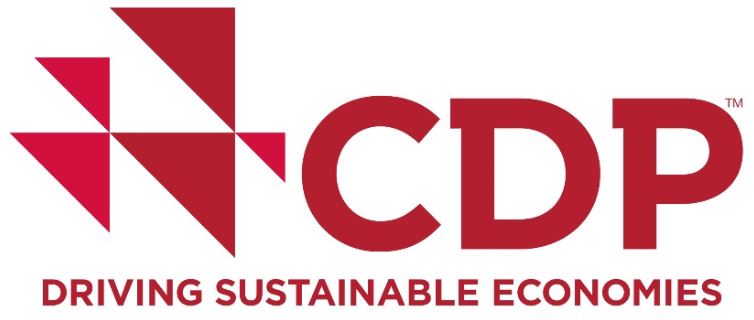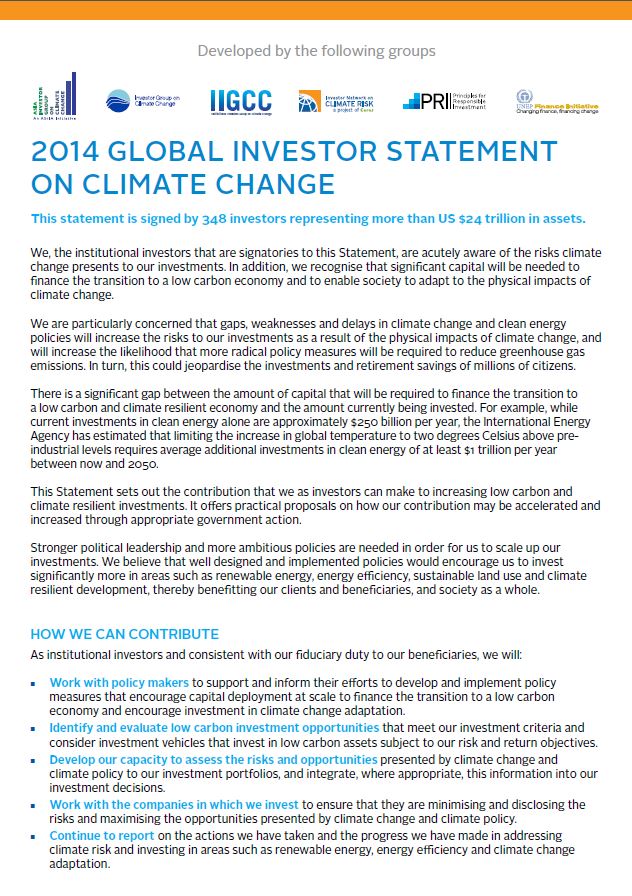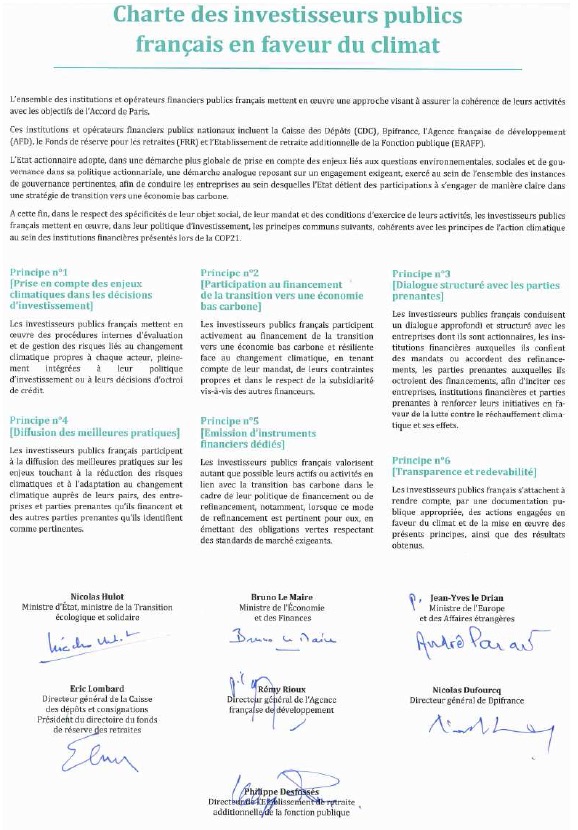Initiatives supported by the FRR
Consistent with this strategy, the FRR played an active role in 2005 in the UN-sponsored initiative aimed at promoting responsible investment behavior on the part of institutional investors (PRI) and, in 2006 supported other initiatives, such as the Carbon Disclosure Project (CDP) and academic research in the area of SRI.
In early 2005, the General Secretary of the United Nations asked an international group of investors that included the FRR to develop a number of principles in the aim of promoting the integration of socially responsible investment practices into the financial management process. After six working sessions, and with the help of experts participating on behalf of the various stakeholders (businesses, NGOs, researchers, etc.), the Principles for Responsible Investment (PRI) were defined and then officially singed in New York City and Paris in the spring of 2006.
In their present form, the PRI reflect the shared values of the participating group of long-term investors with diversified portfolios, including insurers and reinsurers, pension reserve funds and other public institutional investors, as well as private sector pension funds. These principles are fully compatible with the FRR’s SRI strategy.
Supported by the UNEP (United Nations Environmental Programme), the CDP is one of the most important initiatives to emerge from the English-speaking world in the area of the environment and climatic change. Interested in promoting fuller disclosure of the environmental records and practices of businesses, as well as their level of energy use and their climatic impacts, the FRR joined the CDP for the first time in late 2005, just prior to the extension of the annual CDP questionnaire to the 120 largest listed companies in France, which make up the SBF index.
The FRR backed the French management association’s launch of an SRI Chair in France. This entails the constitution of a theoretical base for analyzing investor demand and how financial professionals should address it. It also seeks to establish a set of operational asset evaluation rules that combine financial, social and environmental criteria. The results of this work will be validated scientifically via international publications. The Chair is made up of specialists in finance, econometrics and industrial economy at the Institut d’économie industrielle (IDEI), in association with the University of Toulouse 1, and the Economics department of the École polytechnique. Research began in the first quarter of 2007.
The EITI aims to strengthen transparency and responsibility of participants in the extractive industries sector through the verification and full publication of company payments and government revenues from mining, oil and gas. By supporting the EITI, FRR invites all the companies belonging, directly or indirectly to this sector in its portfolio to take part in this Initiative and, for those which are already committed to support it, to play an active part in its implementation.
- Collaborate with policy makers to support measures that encourage the financing of transition to a low carbon economy;
- Identify and evaluate low carbon investment opportunities;
- Develop investors capacity to assess the risks and opportunities linked to climate change and integrate this information in the investment decisions;
- Enhance dialogue with investee companies on the topic of climate change;
- Report on actions taken and progress made.
- to improve transparency,
- to map the relevant social risks,
- to strengthen long-term relationships with suppliers with the aim of improving supply chain management, and
- to participate in sectoral initiatives in order to increase the chances of success of the sector as a whole.

« Improving transparency remains a priority commitment for the FRR »
Two stakeholders have been identified:
1. The major operators in the textile sector
The major operators are naturally more advanced on supply chain issues because of their higher exposure to reputational risks. They are more transparent with regard to the procedures put in place to manage their risks and improve relationships with their suppliers.
The diversified operators whose textile operations do not represent a significant proportion of their revenues.
This second group includes the large retail chains. Diversified operators are less exposed and have less transparent procedures for identifying and managing their risks concerning supply sources and their performance in terms of risk prevention. The counter-argument put forward is that some information is sensitive and publishing it could adversely affect their competitive advantages.
For the next phase of the engagement programme, the FRR and the other investors taking part in this initiative, have decided to focus their efforts on the following three action areas:- managing the risks associated with the use of suppliers in high-risk geographical areas,
- strengthening long-term relationships with suppliers, and
- improving the industry’s standards via targeted sectoral initiatives.







